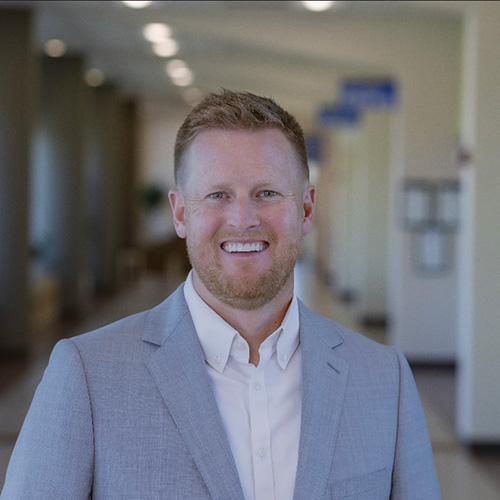Dave Henriksen
B.A. History, 2008
 Meet Dave!
Meet Dave!
Dave Henriksen grew up in Holladay, Utah. After high school, he played basketball at Snow College and later served an LDS mission in Thailand. Once returning home from Thailand, he attended the University of Utah and earned a Bachelor’s of Arts in History. He continued his education by pursuing a Master’s in Healthcare Administration from the University of Minnesota. Henriksen has built a successful career in operations over 15 years working with companies such as Kaiser Permanente, Intermountain Healthcare and Castell. He currently holds the position as Head of Value Based Care at Notable, an AI platform for Healthcare Operations. Henriksen also enjoys sharing the skills and expertise he’s learned over the years by teaching a project management course at the University of Utah.
Q: What made you choose the University of Utah and why did you decide to study History?
A: Having grown up in Utah, the University of Utah was always a top choice, offering me an opportunity to stay close to home. With my father and grandpas also being alums, I was excited to follow in their footsteps!
When I returned home from my mission, I started a window washing company but quickly realized it wasn’t for me. One day after work, I decided I’d had enough and began exploring other career options. I wanted a career that focused on helping people, so I arranged to job shadow the CEO of Primary Children’s Hospital to gain insight into his role, and loved it! At that moment, I knew this was the career path I wanted to pursue. When I asked him, which degree would be most beneficial, he shared that any undergraduate degree could work—his own was in English.
I decided to pursue a degree in History because I was fascinated by cultures, languages, and history after living in Thailand for a few years. I also wanted to learn more about Asian culture and their history. I took my first general requirement history class, and failed the first exam miserably. I was surprised by how difficult the course had proven to be, and decided to major in it! I wanted to challenge myself by learning something that didn’t come easily but was enjoyable and would greatly benefit my future career.
Professor Ben Cohen also played a significant role in my decision to study history. As an exceptional writer and teacher, his classes were always thought-provoking and engaging. His passion for history had a big impact on my own desire to major in history.
Q: What advice would you give to current humanities students?
A: Embrace a growth mindset—this is your time to learn and push beyond your comfort zone. Try new things, explore classes that pique your interest, and don’t shy away from challenging subjects. It’s okay to fail! You’re capable of overcoming hard classes if you stick with it and never give up. Focus on getting better at what you’re NOT good at, and pursue a career that excites you and motivates you to get out of bed each morning by discovering your 'why.'
Q: What impact has your education from the College of Humanities had on your life?
A: My degree in History thoroughly prepared me for both my career and life after college. It equipped me with strong reading and writing skills, taught me critical thinking, and truly opened my eyes to seeing different perspectives—valuable assets in any professional field.
My degree also set me apart when applying for graduate school. The University of Minnesota has a highly competitive program, but I was among the few applicants with a humanities background. The admissions office noted that they were looking for candidates who could bring a unique perspective and educational experience.
Q: What advice would you give to graduating students as they start to explore a career and life after college?
A: This is an important period of your life. Make sure to try new things, and experiment with what fills your cup. If something isn’t working for you, pivot and try something else. Keep building your network by job shadowing even after graduating and talking to new people. Be sure to stop and reflect often on how your current position makes you feel. If you decide you are looking for a new career path, your network will open doors for you.
Q: How do you currently make an impact through your work or other activities?
A: Working in operations allows me to identify and improve processes, making them more efficient and effective. At Notable, we are striving to simplify and optimize healthcare for humanity. Our AI platform cuts down significantly on doctors' time reading and exploring patients' charts and paperwork. What would normally take between 20 minutes to an hour for doctors to do, Notable scans the charts and paperwork summarizing everything into a few sentences. This gives doctors more time to see patients throughout the day and ensures no crucial information is missed by human error.
Q: What is the best professional advice you’ve ever received?
A: “Pick a stinker!” In your job, look for things that don’t work, and try to fix them. By picking something that already doesn’t work, you are only going to make it better, along with demonstrating your problem-solving abilities.
Pick exposure over money. Choosing roles that may offer a lateral or lower pay but give you the opportunity to work closely with the executive team can open more doors for you in the long run.
